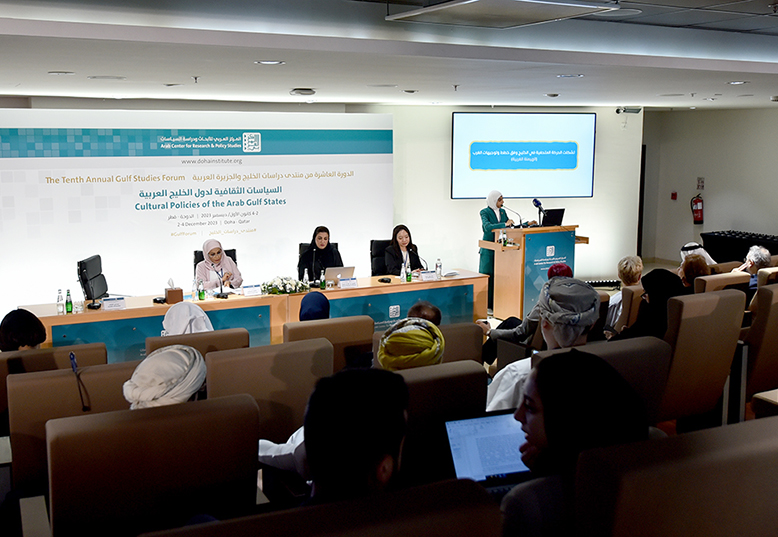Sunday, 3 December 2023 saw the continuation of the
10th Annual Gulf Studies Forum, convened by the Arab Center for Research and Policy Studies, addressing the topic of “Relations between the Gulf States and China” in its international relations track, and of “Cultural Policies of the Arab Gulf States” in its domestic affairs track. The Arab Center is also holding the
Ostour symposium on 4 December 2023, which is set to explore “Historical Writing in the Gulf Countries” over 10 research papers.
International Competition and Gulf-China Relations and Gulf Museums
 The first International Relations track of the day, the GSF’s fourth panel so far, explored International Competition and its Ramifications for the Development of Gulf-China Relations, chaired by Nouf Al Jassar Kadhim. Hashim Niama, Professor of Strategy and Political Science at Baghdad University, presented his paper “Continuity and Change in China's Policy on the Arab Gulf States: The Role of the US”, first. He was followed by Kazuto Matsuda, PhD student at Sophia University in Japan, who presented “China, and the GCC States: Discussing the Triparty Political Dynamics in the Gulf”, and Aftab Alam, Researcher with the Department of Political Science at Abdul Wali Khan University, Pakistan, who presented “China-GCC Ties: Evolving Challenges and Dynamics for Pakistan”.
The first International Relations track of the day, the GSF’s fourth panel so far, explored International Competition and its Ramifications for the Development of Gulf-China Relations, chaired by Nouf Al Jassar Kadhim. Hashim Niama, Professor of Strategy and Political Science at Baghdad University, presented his paper “Continuity and Change in China's Policy on the Arab Gulf States: The Role of the US”, first. He was followed by Kazuto Matsuda, PhD student at Sophia University in Japan, who presented “China, and the GCC States: Discussing the Triparty Political Dynamics in the Gulf”, and Aftab Alam, Researcher with the Department of Political Science at Abdul Wali Khan University, Pakistan, who presented “China-GCC Ties: Evolving Challenges and Dynamics for Pakistan”.
In the domestic affairs track, the first session centered on “Museums in the Gulf countries and Identity Building”, moderated by Aisha Al Darmaki. Sundus Al-Rashid, Head of the International Committee of Museums - ICOM, Kuwait branch, and a member of the Board of Directors of ICOM Arab, began by presenting “Museums in the Arab Gulf States: Cultural Symbols, or Political Forces?”. ACRPS Researcher, Alanoud Abdulla Al-Khalifa, spoke next on “Heritage and Global Expansion: Qatar National Museum’s Discourse on Promoting Contemporary Qatari Identity”, followed by Hae Won Jeong, Assistant Professor of Strategic Studies at the National Defense College in the United Arab Emirates, with her paper, “Cultural Production and Nation Branding in the Digital Age: Science, Technology, and Innovation in the United Arab Emirates”.
Energy and Security between the Gulf and China and Gulf Cultural Institutions
The next International Relations session, chaired by Hatim al-Shanfari, was dedicated to “Security and Energy in China-Gulf Relations”. Degang Sun, Political Science Professor at Fudan University in Shanghai & Si Liu, Assistant Professor at Georgetown University in Qatar, presented “China's Policy towards Gulf Security: Hedging Strategy”. They were followed by Dhafer Al-Ajmi, Executive Director of the Gulf Monitoring Group and Adjunct Professor at Kuwait University, who discussed his paper “China-Gulf Security Relations: Incentives and Challenges”, and Mostafa Al Bazergan, Head of the Centre for Energy & Environment Information and Research in London, rounded off the session with “The Importance of the Gulf States' Position in China's Global Ambitions”.
Meanwhile, the next session in the domestic track was “Gulf Cultural Strategies and Cultural Institutions” chaired by Maryam Al-Kuwari. Said Al Tarshi, Director of the Research, Translation, and Publishing Department at the Omani Ministry of Culture, Sports, and Youth, presented “Gulf and Omani Cultural Strategies: A Comparative Critical Analysis”, followed by Kuwaiti writer and researcher, Khaled AlKhaldi, with his paper, “Cultural Institutions in Kuwait: From Rise to Fall”. Abdulrahman Al-Marri, Research Assistant at the Ibn Khaldon Center at Qatar University finished off the session with “The Cultural Horizon Fused: On the Inadequacy of the Shared Space Between the Individual and the Cultural Institution in Qatar”.
Belt and Road Initiative and Identity Building in the Gulf
The sixth session in the International Relations track, chaired by Majed al-Turki, focused on China’s Belt and Road Initiative. Gangzheng She, Associate Professor in the Department of International Relations and Director of the Center for External Security at Tsinghua University in Beijing, presented “Sino-GCC Relations under the Developing Multidimensional BRI”. Emad Kaddorah, Researcher and Head of the ACRPS Editing Department, presented his paper, “The Position of the Gulf States in the Belt and Road Initiative”, followed by Omani Economist Yousuf bin Hamad Al-Balushi, “Gulf-China Relations from a Strategic Perspective”.
The sixth domestic track, chaired by Ibtihal Al-Khatib, focused further on National Identity Building. Mohamed Alyahyai, Omani journalist and novelist presented “State Management of Identity in its Cultural Dimension: The Case of Oman”, followed by Omani Researcher and Educator, Saif bin Adi Al-Maskari and Assistant Professor at the University of Nizwa in Oman, Nasser bin Saif Al-Saadi with “Cultural Identity Narratives in Humanities Curricula Adopted for Grades 5-12 in the Sultanate of Oman”. Finally, Sociology and Anthropology Researchers, Mothanna Al-Masri, & Omar Abdin then presented “Policies of Identity Building and the Re-Production of Heritage: The Cultural Status of Diving in Qatar”.
Gulf Culture in a Critical Framework
A final session for the day was titled “Gulf Culture in a Critical Framework,” and chaired by Haider Saeed. Said al-Hashimi presented his paper “Omani Culture after the 2011 Arab Revolutions”.
The Forum will continue for another day, with the
Ostour symposium over three consecutive sessions.
* To read about day one of the forum clik
here.